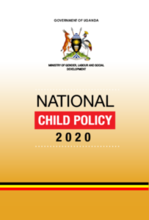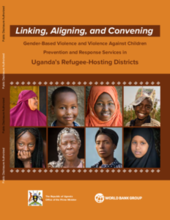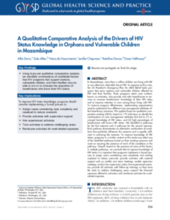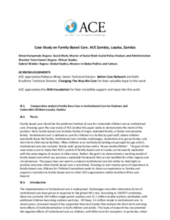Displaying 461 - 470 of 1609
This National Child Policy has been developed to coordinate the efforts of the different sectors that have a direct and indirect mandate on children and deliver a comprehensive package of services encompassing all the four cardinal rights of the child in a multi-sectoral approach.
The Development Response to Displacement Impacts Project (DRDIP) analysis includes a comprehensive mapping of services for GBV and VAC prevention and response across the key sectors of health, police, justice, and social services in refugee settlements and host communities.
The authors of this study applied fuzzy-set qualitative comparative analysis (QCA), based on 119 interviews, to identify the combinations of case management attributes that led to (1) increased knowledge of HIV status, and (2) high percentages of beneficiaries with known HIV status participating in a program that serves orphans and vulnerable children affected by HIV and their families in Mozambique.
The goal of this case study is to demonstrate a working model of family-based care in Zambia which can produce a replicable framework that can be modified for other regions and circumstances.
This National Child Policy of Uganda has been developed to coordinate the efforts of the different sectors that have a direct and indirect mandate on children and deliver a comprehensive package of services encompassing all the four cardinal rights of the child (to survival, development, protection and participation) in a multi-sectoral approach.
Objectif global: Assurer une assise juridique opérationnelle pour la mise en œuvre de la législation relative à la protection des enfants privés de soins parentaux.
The purpose of this study was to investigate the extent to which government allocated financial resources, management procedures and stakeholders are major determinants of implementation of cash transfer program for orphans and vulnerable children in Isiolo County, Kenya.
The authors of this study conducted qualitative interviews of 69 caregivers in four countries: Ethiopia, Kenya, Cambodia, and India (Hyderabad and Nagaland), and across four religious traditions: Christian (Orthodox, Roman Catholic, and Protestant), Muslim, Buddhist, and Hindu. They asked respondents to describe the importance of religion for their becoming a caregiver, the way in which religion has helped them make sense of why children are orphans, and how religion helps them face the challenges of their occupation.
The 20th International Conference on AIDS and STIs in Africa is taking place in Kigali, Rwanda at Kigali Convention Centre.
This end of project evaluation aimed to synthesise the wealth of data and learnings captured over the life of the Family Reintegration and Prevention of Separation (FRAPS) project to determine if project objectives were met, to complement existing data with primary data collection related to final project outcomes, and to provide a final product that can be used to appreciate the project achievements, challenges and learnings and to guide future programming.







